新目标九年级英语Unit2 Section A 教案
- 格式:doc
- 大小:55.00 KB
- 文档页数:5
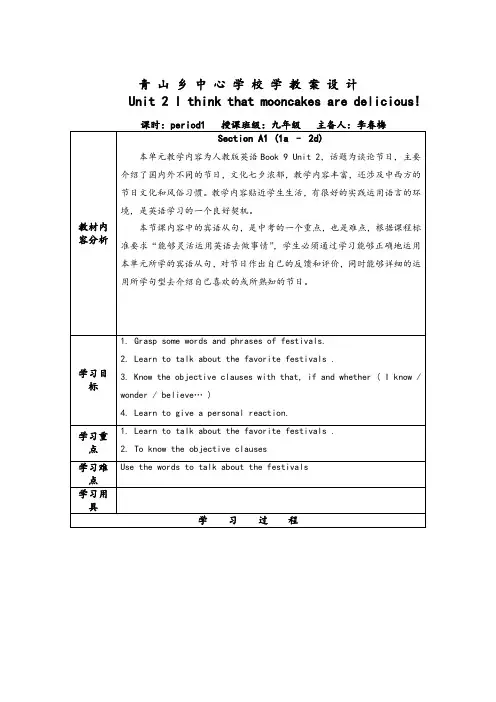
青山乡中心学校学教案设计Unit 2 I think that mooncakes are delicious!课时:period1 授课班级:九年级主备人:李春梅教材内容分析Section A1 (1a – 2d)本单元教学内容为人教版英语Book 9 Unit 2,话题为谈论节日,主要介绍了国内外不同的节日,文化七夕浓郁,教学内容丰富,还涉及中西方的节日文化和风俗习惯。
教学内容贴近学生生活,有很好的实践运用语言的环境,是英语学习的一个良好契机。
本节课内容中的宾语从句,是中考的一个重点,也是难点,根据课程标准要求“能够灵活运用英语去做事情”,学生必须通过学习能够正确地运用本单元所学的宾语从句,对节日作出自己的反馈和评价,同时能够详细的运用所学句型去介绍自己喜欢的或所熟知的节日。
学习目标1. Grasp some words and phrases of festivals.2. Learn to talk about the favorite festivals .3. Know the objective clauses with that, if and whether ( I know / wonder / believe… )4. Learn to give a personal reaction.学习重点1. Learn to talk about the favorite festivals .2. To know the objective clauses学习难点Use the words to talk about the festivals学习用具学习过程自主 学 习导 航(导、学、馈) 根据所给汉语填空 1. Can you see the _________ (灯笼)over there? How beautiful they are! 2. Parents often tell their children not to speak to _________ (陌生人). 3. I got a lot of gifts from my _________ (亲戚) on mybirthday.4. Don ’t eat too much, or you ’ll _______ (增加) yourweight.5. The car cost him 2000 ________ (英镑).学习环节 学习内容 学习活动 修改内容Step 1: Warming-upWhat festivals do you like best?What do you like best about your favourite festival? Step 2: Presentation1 .1a Look at the pictures and guess what festivals they are. Match the pictures with the descriptions.1. ___ The Water Festival in Thailand2. ___ The Dragon Boat Festival in Hong Kong3. ___ The Chinese Spring Festival in Beijing4. ___ The Lantern Festival in JiangxiStep 3 Listening1b Listen and tell true or false.1. Bill thinks that the races were not that interesting to watch. T F2. Mary thinks that the teams were fantastic. T F3. Bill wonders whether they’ll have zongzi again next year. T F4. Bill and Mary believe that they’ll be back next year to watch the races. T FStep 4 Speaking1c Talk about the pictures in 1a.Make conversations.ExamplesA: What do you like best about the Dragon Boat Festival? B: I love the races. I think they’re fun to watch. Step 5 Pair WorkA: What do you like best about the …?B: I love the ... I think that they’re...Step 6 Listening2a Listen to the conversation between Wu Ming and Harry and circle the correct words in sentences.1. Wu Ming and Harry are cousins/ strangers / friends.2. Wu Ming went to Singapore/ Hong Kong / Macao for his1. Wu Ming and Harry are cousins/ strangers / friends.2. Wu Ming went to Singapore/ Hong Kong / Macao for his vacation.3. Wu Ming visited his relatives / friends / classmates.4. Wu Ming liked eating out / shopping / the Dragon Boat Festival best.2b Wu Ming did a lot of fun activities, but there were also downsides. Listen again and fill in the chart. Fun activities DownsidesEating outShoppingDragon Boat Festival in JuneStep 7 Speaking2c Role play the conversations between Wu Ming and Harry. A: What did you do on your vacation?B: I visited my cousins. I think that we ate five meals a day! I’ve put on five pounds.A: I guess the food was delicious, right?Step 8 Role –playWatch the video and learn Water Festival.Read the conversation and tell “True” or “False”.1. Ben is going to Chiang Mai in two weeks. ( )2. Clara believes that April is the hottest month of the year there. ( )3. The Water Festival in Thailand is from April 13th to 15th. ( )4. The Thai new year is a time for cleaning and washing bad things. ( )Role –play the conversation课堂达标练习 (分层设计)(展、练)Exercises 1. ( )—Do you know ____ Jane visits her grandparents? —Once a week. A. how soon B. how often C. how long D. how far 2. ( ) —I want to know .—Sorry. I ’ve no idea. But she was here just now.A. where is AnnB. where Ann isC. where was AnnD. where Ann was3. ( ) —Hi, Bruce. Here is a letter for you.— Thanks. I wonder .A. who the letter was fromB. who was from the letterC. who was the letter fromD. who from the letter was4. ( ) —Do you know_____?—He is a dentist.A. where he is fromB. where is he fromC. what does his father doD. what his father is5. ( ) Could you tell me _____the cool T-shirt?A. where you buyB. where do you buyC. where did you buyD. where you bought6. ( ) Please tell me _____ to improve my English.A. how I can doB. what can I doC. what I can doD. how can I do课堂小结(馈)A: What do you like best about the …? B: I love the ... I think that they ’re...作业布置(馈)1. Learn the new words and expressions by heart.2. Copy the sentences with the Objective Clause and learn them by heart.板书设计 Unit 2 I think that mooncakes are delicious!课时:period1Section A1 (1a – 2d)宾语从句在复合句中,由一个句子充当宾语,这个句子叫做宾语从句。
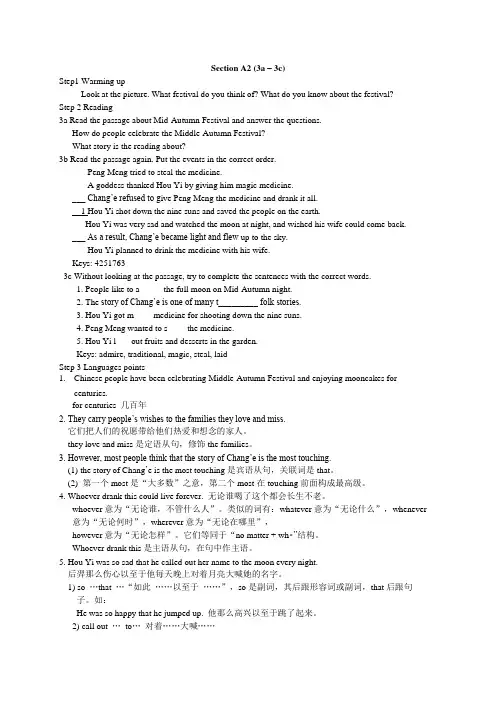
Section A2 (3a – 3c)Step1 Warming upLook at the picture. What festival do you think of? What do you know about the festival?Step 2 Reading3a Read the passage about Mid-Autumn Festival and answer the questions.How do people celebrate the Middle-Autumn Festival?What story is the reading about?3b Read the passage again. Put the events in the correct order.___ Peng Meng tried to steal the medicine.___ A goddess thanked Hou Yi by giving him magic medicine.___ Chang’e refused to g ive Peng Meng the medicine and drank it all.1 Hou Yi shot down the nine suns and saved the people on the earth.___Hou Yi was very sad and watched the moon at night, and wished his wife could come back.___ As a result, Chang’e became light and flew up to the sky.___ Hou Yi planned to drink the medicine with his wife.Keys: 42517633c Without looking at the passage, try to complete the sentences with the correct words.1. People like to a_____ the full moon on Mid-Autumn night.2. The story of Chang’e is one of many t_________ folk stories.3. Hou Yi got m____ medicine for shooting down the nine suns.4. Peng Meng wanted to s____ the medicine.5. Hou Yi l___ out fruits and desserts in the garden.Keys: admire, traditional, magic, steal, laidStep 3 Languages points1.Chinese people have been celebrating Middle-Autumn Festival and enjoying mooncakes forcenturies.for centuries 几百年2. They carry people’s wishes to the families they love and miss.它们把人们的祝愿带给他们热爱和想念的家人。
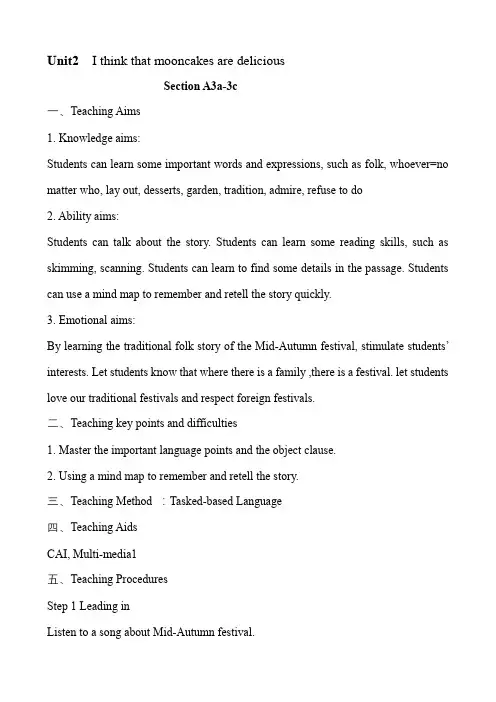
Unit2 I think that mooncakes are deliciousSection A3a-3c一、Teaching Aims1. Knowledge aims:Students can learn some important words and expressions, such as folk, whoever=no matter who, lay out, desserts, garden, tradition, admire, refuse to do2. Ability aims:Students can talk about the story. Students can learn some reading skills, such as skimming, scanning. Students can learn to find some details in the passage. Students can use a mind map to remember and retell the story quickly.3. Emotional aims:By learning the traditional folk story of the Mid-Autumn festival, stimulate students’ interests. Let students know that where there is a family ,there is a festival. let students love our traditional festivals and respect foreign festivals.二、Teaching key points and difficulties1. Master the important language points and the object clause.2. Using a mind map to remember and retell the story.三、Teaching Method :Tasked-based Language四、Teaching AidsCAI, Multi-media1五、Teaching ProceduresStep 1 Leading inListen to a song about Mid-Autumn festival.Purpose: Lead into the topic and arouse students’ interest.Step 2 Pre-readingShow the picture and the title in 3a. Ask questions: The Mid-Autumn festival is coming, right? What will you do on that day ?Step 3 While-readingFast readingReading StrategySkimming Read quickly to grasp the main idea.Task1:Read paragraph 1 quickly then answerQ1and Q2.Q1: What do the mooncakes look like?______________Q2: What does they in paragraph 1 refer to (指的是?)______________________ Read paragraph 2 quickly then answerQ3-Q6Q3: Why the goddess gave Hou Yi the magic medicine?______________Q4:从文中找出与“No matter who drank this could never die.” 意思相近的句子。
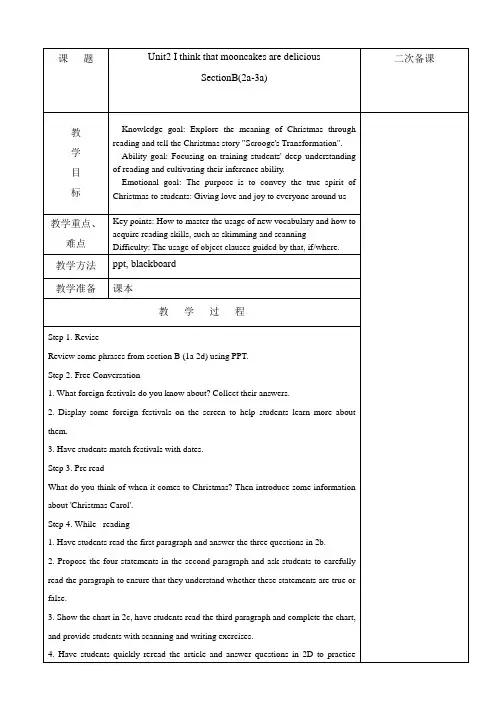
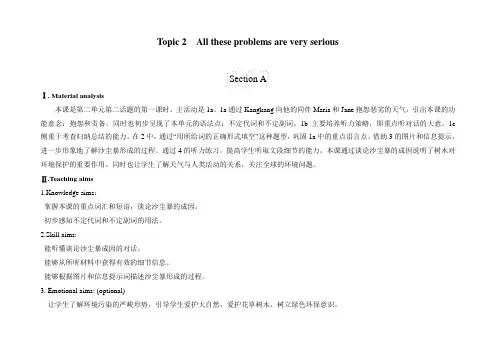
Topic 2 All these problems are very seriousSection AⅠ. Material analysis本课是第二单元第二话题的第一课时。
主活动是1a。
1a通过Kangkang向他的同伴Maria和Jane抱怨恶劣的天气,引出本课的功能意念:抱怨和责备。
同时也初步呈现了本单元的语法点:不定代词和不定副词。
1b主要培养听力策略,即重点听对话的大意。
1c 侧重于考查归纳总结的能力。
在2中,通过“用所给词的正确形式填空”这种题型,巩固1a中的重点语言点。
借助3的图片和信息提示,进一步形象地了解沙尘暴形成的过程。
通过4的听力练习,提高学生听取文段细节的能力。
本课通过谈论沙尘暴的成因说明了树木对环境保护的重要作用。
同时也让学生了解天气与人类活动的关系,关注全球的环境问题。
Ⅱ.Teaching aims1.Knowledge aims:掌握本课的重点词汇和短语,谈论沙尘暴的成因。
初步感知不定代词和不定副词的用法。
2.Skill aims:能听懂谈论沙尘暴成因的对话。
能够从所听材料中获得有效的细节信息。
能够根据图片和信息提示词描述沙尘暴形成的过程。
3. Emotional aims: (optional)让学生了解环境污染的严峻形势,引导学生爱护大自然,爱护花草树木,树立绿色环保意识。
4. Culture awareness: (optional)通过课文的学习,让学生了解沙尘暴形成的原因和过程,关注全球的环境问题。
Ⅲ. The key points and difficult points1. Key points:Words and phrases: sand, although, sandstorm, desert, human being, reduce, completely, change into, stop … from, blow/ wash … away, as a resultSentences: A lot of water can be saved by forests.Although we have built “The Green Great Wall”, we still need to do something to protect the environment.Grammar: Indefinite pronoun and adverb.2.Difficult points:能够从所听材料中获得有效的细节信息来补全句子。
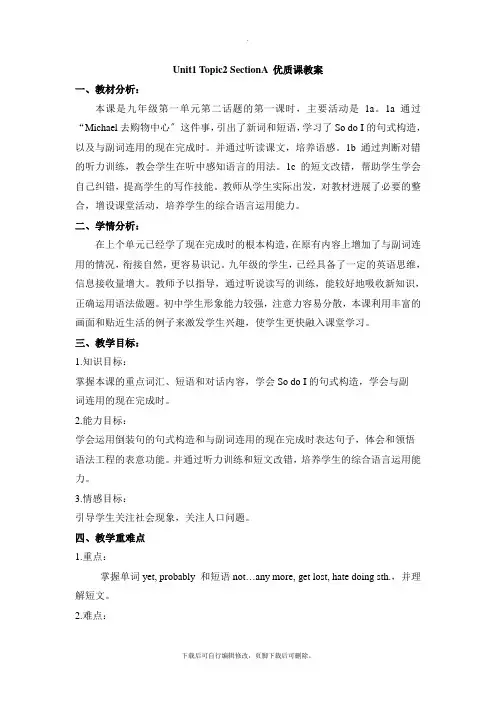
Unit1 Topic2 SectionA 优质课教案一、教材分析:本课是九年级第一单元第二话题的第一课时,主要活动是1a。
1a通过“Michael去购物中心〞这件事,引出了新词和短语,学习了So do I的句式构造,以及与副词连用的现在完成时。
并通过听读课文,培养语感。
1b通过判断对错的听力训练,教会学生在听中感知语言的用法。
1c的短文改错,帮助学生学会自己纠错,提高学生的写作技能。
教师从学生实际出发,对教材进展了必要的整合,增设课堂活动,培养学生的综合语言运用能力。
二、学情分析:在上个单元已经学了现在完成时的根本构造,在原有内容上增加了与副词连用的情况,衔接自然,更容易识记。
九年级的学生,已经具备了一定的英语思维,信息接收量增大。
教师予以指导,通过听说读写的训练,能较好地吸收新知识,正确运用语法做题。
初中学生形象能力较强,注意力容易分散,本课利用丰富的画面和贴近生活的例子来激发学生兴趣,使学生更快融入课堂学习。
三、教学目标:1.知识目标:掌握本课的重点词汇、短语和对话内容,学会So do I的句式构造,学会与副词连用的现在完成时。
2.能力目标:学会运用倒装句的句式构造和与副词连用的现在完成时表达句子,体会和领悟语法工程的表意功能。
并通过听力训练和短文改错,培养学生的综合语言运用能力。
3.情感目标:引导学生关注社会现象,关注人口问题。
四、教学重难点1.重点:掌握单词yet, probably 和短语not…any more, get lost, hate doing sth.,并理解短文。
2.难点:能正确运用So do I的句式构造和使用与ever. never. just. yet. already 等词连用的现在完成时。
五、教学过程:ng students ready for learning:师生间常规问候和交流。
2.Pre-listening:①观看视频,猜想是视频中展示的是哪个地方,引出a shopping center。
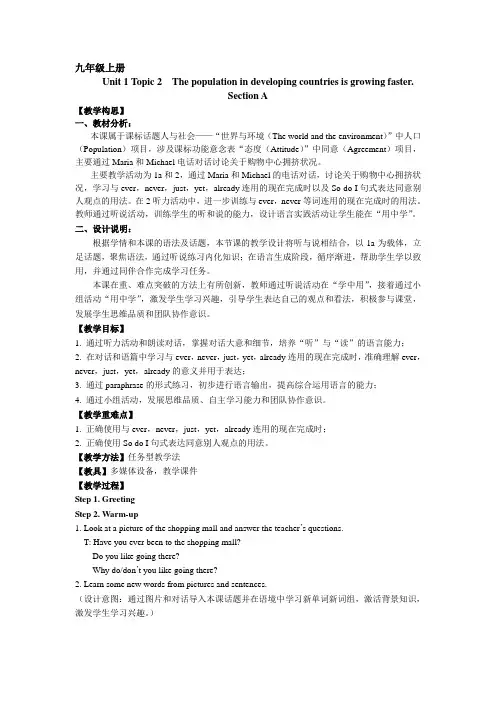
九年级上册Unit 1 Topic 2 The population in developing countries is growing faster.Section A【教学构思】一、教材分析:本课属于课标话题人与社会——“世界与环境(The world and the environment)”中人口(Population)项目,涉及课标功能意念表“态度(Attitude)”中同意(Agreement)项目,主要通过Maria和Michael电话对话讨论关于购物中心拥挤状况。
主要教学活动为1a和2,通过Maria和Michael的电话对话,讨论关于购物中心拥挤状况,学习与ever,never,just,yet,already连用的现在完成时以及So do I句式表达同意别人观点的用法。
在2听力活动中,进一步训练与ever,never等词连用的现在完成时的用法。
教师通过听说活动,训练学生的听和说的能力,设计语言实践活动让学生能在“用中学”。
二、设计说明:根据学情和本课的语法及话题,本节课的教学设计将听与说相结合,以1a为载体,立足话题,聚焦语法,通过听说练习内化知识;在语言生成阶段,循序渐进,帮助学生学以致用,并通过同伴合作完成学习任务。
本课在重、难点突破的方法上有所创新,教师通过听说活动在“学中用”,接着通过小组活动“用中学”,激发学生学习兴趣,引导学生表达自己的观点和看法,积极参与课堂,发展学生思维品质和团队协作意识。
【教学目标】1. 通过听力活动和朗读对话,掌握对话大意和细节,培养“听”与“读”的语言能力;2. 在对话和语篇中学习与ever,never,just,yet,already连用的现在完成时,准确理解ever,never,just,yet,already的意义并用于表达;3. 通过paraphrase的形式练习,初步进行语言输出,提高综合运用语言的能力;4. 通过小组活动,发展思维品质、自主学习能力和团队协作意识。
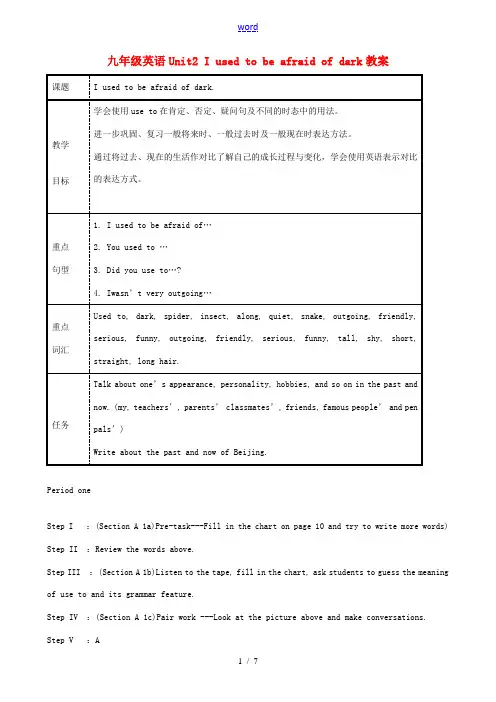
九年级英语Unit2 I used to be afraid of dark教案Period oneStep I :(Section A 1a)Pre-task---Fill in the chart on page 10 and try to write more words) Step II :Review the words above.Step III :(Section A 1b)Listen to the tape, fill in the chart, ask students to guess the meaning of use to and its grammar feature.Step IV :(Section A 1c)Pair work ---Look at the picture above and make conversations. Step V :AShow a picture of a teacher at his/ her young age to students and ask them to guess who the teacher is.BThen ask to answer according to the pictureWhat did he use to be like?What does he like now?What did he use to like?What does he like now?He used to be very short.He used to be very shy.And he used to have straight hair.But now he is tall, outgoing and has curly hair.Like this:Step VI :Pair work ( use the chart below.)What did you use to be like?Did you use to…Period 2Step I :(Section A 2a & 2b)Listen and fill in the chart on page 11 and check the words you hear. Step II : (Section A 3a & 3b )Students look and chart and check the things that they used to be afraid ofand things that they are still afraid of and the same with their partners.Step III :Make a survey of things that boys and girls used to be afraid of most separately. Step IV :ReportPeriod 3Step I :(Section B 1a)Ask several students what they used to like when they were children.Then check the things you liked when you were a child.Step II : (Section B 1b )Group work---What other things did you use to like to do when you were a child?What do you like to do most now?Write sentences in the box above.Then discuss them with a partner.Step III :Report the things students used to like most in the past and now of each group. Step IV :(Section B 3a)Read the story about Rose Tang’s problems and then plete the chart.And answer these questions.Did Rose get up early and stay in school all day?Did Rose use to chat with her grandfather?Does she have time for concerts?Step V :(Section B 3b)plete this letter. Use the information form the chart in activity 2b.Step VI :ReportPeriod 4Step I :A---(Work book P7 6)Read the article. Then answer the questions using short answers.B---(Evaluation Book P4 E)Read the story about a student’s problem. Fill in the chart about things that were true in the past and thing that are true now.Step II : (Section B 2b)Listen and check the sentences you hear.(Section B 2c )Listen again. What do the girl and the boy say about things in the past and now? Fill in the chart.Step III :Group work---(work in a group of four).---GameDescribe the past and now of a famous figure and ask other students to guess who he is.Step IV :(Section B 4a)Pair work---What did your parents use to do when they were children? How is it different from what you do?Step V : Group work---Write about the past, now and future of Beijing..Step VI : ReportHomework:Write about the past and now of your favorite city or a country.Write about the past and now of your parents / classmates / pen pals/ the person you admire.Write about the past and now of your school or class.Write about the past and now of your home.知识拓展:在英语中used to, be used to doing, be used to do, be used for / as等用法容易混淆,下面简单总结这几种用法的区别:used to do sthused to中的to是不定式符号,后加动词原形,表示“过去常常做某事,而现在已不做”,时态形式不变。
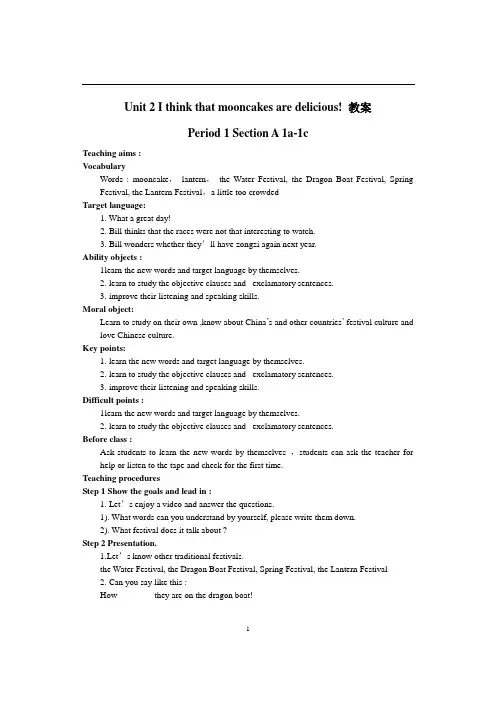
Unit 2 I think that mooncakes are delicious! 教案Period 1 Section A 1a-1cTeaching aims :VocabularyWords : mooncake,lantern,the Water Festival, the Dragon Boat Festival, Spring Festival, the Lantern Festival,a little too crowdedTarget language:1. What a great day!2. Bill thinks that the races were not that interesting to watch.3. Bill wonders whether they’ll have zongzi again next year.Ability objects :1learn the new words and target language by themselves.2. learn to study the objective clauses and exclamatory sentences.3. improve their listening and speaking skills.Moral object:Learn to study on their own ,know about China’s and other countries’ festival culture and love Chinese culture.Key points:1. learn the new words and target language by themselves.2. learn to study the objective clauses and exclamatory sentences.3. improve their listening and speaking skills.Difficult points :1learn the new words and target language by themselves.2. learn to study the objective clauses and exclamatory sentences.Before class :Ask students to learn the new words by themselves ,students can ask the teacher for help or listen to the tape and check for the first time.Teaching proceduresStep 1 Show the goals and lead in :1. Let’s enjoy a video and answer the questions.1). What words can you understand by yourself, please write them down.2). What festival does it talk about ?Step 2 Presentation.1.Let’s know other traditional festivals.the Water Festival, the Dragon Boat Festival, Spring Festival, the Lantern Festival2. Can you say like this :How________ they are on the dragon boat!1What a great day the Water Festival is!3. What do you think of these festivals ?Please say like this:I think that Spring Festival is_____I believe that Spring Festival is_____Step 3 Listening1.Mary and Bill just had a great day on Dragon Boat Festival. They are talking aboutwhat they like best about this festival. Listen to their conversation and circle T or F.2. Check the answers.3. Follow the tape.Step 4 Pair work.1.1c Talk about the pictures in 1a. Or make your own conversations.Examples 1A: What do you like best about the Dragon Boat Festival?B: I love the races. I think they’re fun to watch.Examples 2A Hi,…Of all the traditional festivals, which is your favorite festival?B Well, I like the Chinese Spring Festival best?A What do you like best about …?B I love the feeling that all the family member get together …Step 5 read and think.Read the sentences and find the tules.1.What a great day!2.How fantastic the dragon boat teams were!3. How pretty they were!I guess it was a little too crowded.I wonder if they’ll have the races again next y ear.I believe that I’ll be back again next year to watch the races!Step 6 Summarize.Think about what you learned from this class.Step 7 Homework.2Period 2 Section A 2a-2dTeaching aims :VocabularyWords : stranger, relative, put on, poundTarget language:I believe that we ate at least five meals a day!How delicious the food is!I’ve put on five pounds.I wonder whether June is a good time.Ability objects :1learn the new words and target language by themselves.2. learn to study the objective clauses and exclamatory sentences.3. improve their listening and speaking skills.Moral object:Learn to study on their own ,know about China’s and other countries’ festival culture and love Chinese culture.Key points:1learn the new words and target language by themselves.2. learn to study the objective clauses and exclamatory sentences.3. improve their listening and speaking skills.Difficult points :1learn the new words and target language by themselves.2. learn to study the objective clauses and exclamatory sentences.Before class :Ask students to learn the new words by themselves ,students can ask the teacher for help or listen to the tape and check for the first time.Teaching proceduresStep 1 Lead in .3Watch the video and answer:what festival is it ? What do you think of it ?Please say like this :How ___________________!What ________________!I think/ guess/ believe_____________.Step 2 work on 2d.1. Before reading , can you ask questions about the Water Festival in Thailand ?Where / when / what/why…2. While readingRead 2d, and fill in the blanks.3. Role-play the conversationStep 3 Work on 2a &2b.2aWu Ming went somewhere for his holiday.Where did he go? Who did he visit? What did he enjoy best? Read and predict.1 Wu Ming and Harry are cousins/strangers/friends.2 Wu Ming went to Singapore/ Hong Kong/ Macao for his vacation.3 He visited his relatives/friends/classmates.4 He enjoyed eating out/ shopping/ the Dragon Boat Festival best.2bWu Ming did a lot of fun activities, but there were also downslides. Listen again and fill in the chart.Please take notes and use abbreviation.Fun Activities DownslidesEating out putting on five poundsShopping spending so much moneyDragon Boat Festival in June quite hotStep 4 work on 2cRole –play conversations between Wu Ming and Harry. Use the information in 2a and 2b or make your own conversations.A Hi,…Where did you go on your vacation?B I went to…A What did you do there?B I visited…I think that I ate five meals a day and I’ve put on five pounds.A I guess the food was delicious, right? What else did you do?B…A What was the best part of this trip?B I think…4Step 5WritingPlease introduce a Chinese festival you experienced to friends in Thailand.Dear friend in Thailand,I like _______ best. on __________Festival, I/we___________________________. Ithink __________________________....Yours in ChinaStep 6 Summary and homework.第3课时Section B 1a-2e教学目标一、知识与技能1. 掌握本节课重点短语和词汇。
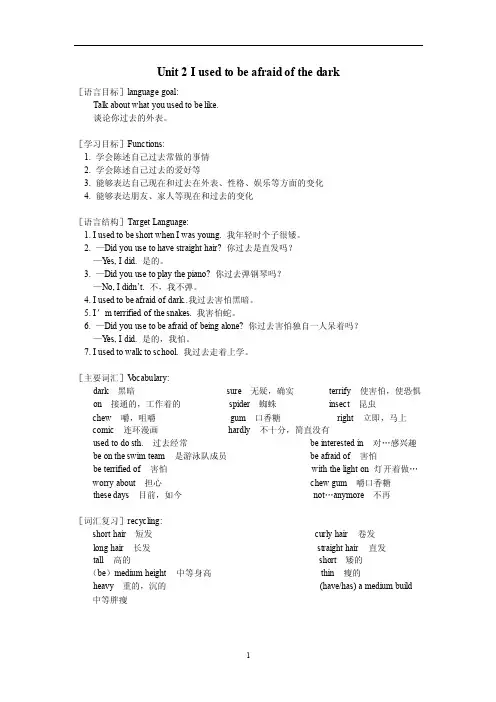
Unit 2 I used to be afraid of the dark[语言目标]language goal:Talk about what you used to be like.谈论你过去的外表。
[学习目标]Functions:1. 学会陈述自己过去常做的事情2. 学会陈述自己过去的爱好等3. 能够表达自己现在和过去在外表、性格、娱乐等方面的变化4. 能够表达朋友、家人等现在和过去的变化[语言结构]Target Language:1. I used to be short when I was young. 我年轻时个子很矮。
2. —Did you use to have straight hair? 你过去是直发吗?—Y es, I did. 是的。
3. —Did you use to play the piano? 你过去弹钢琴吗?—No, I didn’t. 不,我不弹。
4. I used to be afraid of dark..我过去害怕黑暗。
5. I’m terrified of the snakes. 我害怕蛇。
6. —Did you use to be afraid of being alone? 你过去害怕独自一人呆着吗?—Y es, I did. 是的,我怕。
7. I used to walk to school. 我过去走着上学。
[主要词汇]V ocabulary:dark 黑暗sure 无疑,确实terrify 使害怕,使恐惧on 接通的,工作着的spider 蜘蛛insect 昆虫chew 嚼,咀嚼gum 口香糖right 立即,马上comic 连环漫画hardly 不十分,简直没有used to do sth. 过去经常be interested in 对…感兴趣be on the swim team 是游泳队成员be afraid of 害怕be terrified of 害怕with the light on 灯开着做…worry about 担心chew gum 嚼口香糖these days 目前,如今not…anymore 不再[词汇复习]recycling:short hair 短发curly hair 卷发long hair 长发straight hair 直发tall 高的short 矮的(be)medium height 中等身高thin 瘦的heavy 重的,沉的(have/has) a medium build 中等胖瘦[语法分析]一、本单元语法重点内容是used to这个句型。
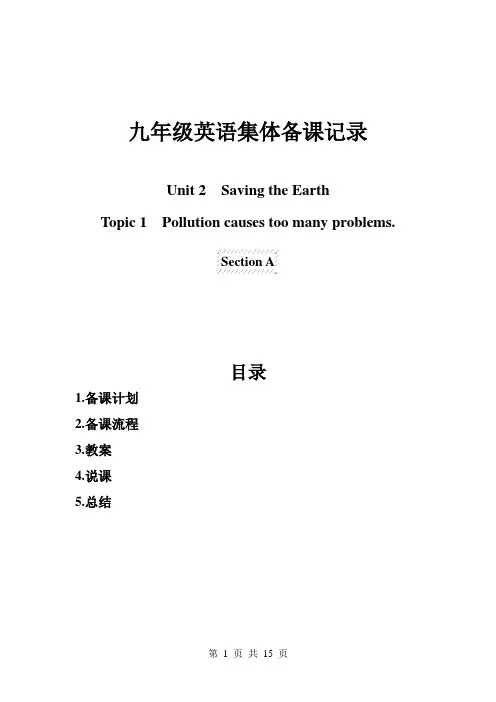
九年级英语集体备课记录Unit 2 Saving the EarthTopic 1 Pollution causes too many problems.Section A目录1.备课计划2.备课流程3.教案4.说课5.总结“关注课前准备实施有效教学”计划英语备课组学校年月日“关注课前准备实施有效教学”计划一、指导思想以新课程倡导的教育理念为指导,整合和拓展前一段“新一轮新理念下的中小学常规教学基本功达标活动”取得的成果,以提高课堂教学能力和新课程课堂教学效率为目标,开展以“课堂教学准备能力训练”、“课堂教学实施能力训练”、“课堂教学评价能力训练”为内容的“新课程课堂教学能力训练活动”。
本次活动共有三个阶段,“课前准备”、“课堂教学”、“课后评价”。
二、“新课程课堂教学能力训练”实施步骤在课前准备上,能按照“教材分析、学习者特征分析、确定与叙写教学目标、进行最近发展区分析与合理确定教学流程、教学方法与选择教学策略、编制教学方案”七个步骤进行教学准备。
在教学准备的各个步骤中做到:1.制定本团队“课堂教学准备能力训练”计划;2.研究当前教师教学准备中存在的问题,研究教学准备中教师需要关注的关键问题,讨论训练教材中确定的进行有效教学准备六个步骤的可行性;3.确定一节本学科的典型课进行教学准备,根据有效教学准备六步骤的要求,在训练活动小组成员独立、全面思考的基础上,确定每个成员需要承担(六步骤中)的重点任务。
每个成员针对任务学习培训教材中相关论述和案例,查阅课程标准的相关要求(每个成员都要有相应学科的课程标准以利学习和使用),写出发言提纲;4.在小组中各抒己见,深入研讨,求同存异,经历有效教学准备的六个步骤,达成共识,形成教学方案;5.由训练小组中一位教师在课堂教学中执教这个教学方案6.进行阶段性总结。
三、时间安排1.10月8日训练小组制定本团队的方案。
2.10月10日——10月14日,训练小组确定一节具典型性的英语课,小组成员针对这节课各自按照训练教材中有效教学准备的要求进行思考,写出在训练小组研修中发言的发言纲要。
九年级英语下册Unit6 Topic 2 SectionA教案(仁爱版)本资料为woRD文档,请点击下载地址下载全文下载地址SectionASectionAneeds1period.SectionA需用1课时。
Themainactivitiesare1aand3a.本课重点活动是1a和3a。
Ⅰ.Aimsanddemands目标要求.masternewwordandphrase:makeupone’smind,work2.Reviewdifferentkindsofclauses.attributiveclausesadverbialclausesobjectclauses3.Learnaboutsomefamouspaintersandtheirpaintings.Ⅱ.Teachingaids教具录音机/不同风格的图画及其作者画像或图片Ⅲ.Five-fingerTeachingPlan五指教学方案Step1Review第一步复习复习宾语从句、状语从句、定语从句,并导入新课。
.T:DidyouwatchTVlastnight?S1:yes,Idid.T:whatprogramdidyouwatch?S1:Iwatched...T:whatwasitabout?S1:Itwasabout...2.Ss:DidyouwatchTVlastnight?T:yes,Idid.Ss:whatprogramdidyouwatch?T:Iwatchedaneducationalprogram.Ss:whatwasitabout?T:ItwasastoryaboutVincentvanGogh.HewasafamousDutcha rtist.It’sapitythathediedwhenhewasveryyoung.Thecolorsinhispa intingsarebrightandbeautiful.VincentvanGogh:DutchartistT:“Dutch”meanspeoplefromHolland,languagespokeninHollandandotherthingsaboutHolland.Iwantsomestudentstosaysomethi ngaboutthegreatartist,VincentvanGogh,whocan?Handsup!3.T:Doyoulikedrawing?S2:yes.T:whatdoyouknowaboutpaintings?S2:...T:Ifyouwanttolearnmoreaboutpaintings,youcangotoBeij ingNationalArtGallery.BeijingNationalArtGalleryT:Doyouwanttobeanartist?Ss:yes,...T:whatwillyoudoifyouwanttobeanartist?Ss:...T:yes.Ifyouwanttobeanartist,youmustworkveryhard.S3:Ifyouwanttobeanartist,youmustgotoartclasses.S4:Ifyouwanttobeanartist,youmustwatchthingscarefull y.S5:Ifyouwanttobeanartist,youmustworkveryhard.Ifyouwanttobeanartist,youmustgotoartclasses.Ifyouwanttobeanartist,youmustwatchthingscarefully.Ifyouwanttobeanartist,youmustworkveryhard.T:BeijingNationalArtGalleryisagreatplaceforyoutogo. Ifyoudon’tknowmuchaboutart,youcanasksomebodywhoknowsarttogow ithyou.Ifyoudon’tknowtheway,youcanaskyourfriendswhoknowthewaytogowi thyou.youcanasksomebodywhoknowsarttogowithyou.youcanaskyourfriendswhoknowthewaytogowithyou.T:whocanyouasktogowith?S6:Icanasksomebodywhohasacartogowithme.S7:Icanasksomebodywhoishelpfultogowithme.S8:...S9:...T:Doyouwanttobeanartist?S10:No,Idon’t.T:why?S10:BecauseImustworkveryhard.T:Nowyouknowthatitisnoteasytobeanartist,youcandecid ewhetherornotyouwanttobeanartist.Ifyoustillwanttobe anartist,youmustknowhowhardyoumustwork.4.T:Let’sdoacontest.Allthegirlsinonegroup:G,alltheboysinthe othergroup:B.youcanchallengethemembersoftheothergro up.T:Let’smakesentenceswith “if”.Iwillmakethefirstsentence.T:Iwillgototheparkifitisfinetomorrow.B1:Iwillgotoschoolifitisfinetomorrow.G1:IwillgototheNationalArtGalleryifitisfinetomorrow.B2:......T:Ilikebookswhichhaveinterestingstories.B1:Ilikepaintingswhichhavebeautifullandscapes.G1:……T:××saidhewouldhaveagoodrestifhehadenoughtime.B1:Ifyouwouldn’tknowtheway,youcanaskyourfriends.G1:……Step2Presentation第二步呈现学习1a。
Unit 2 I used to be afraid of the dark.
Time:the 2nd to 3rd week Class: Class 1 and 4
Subject:English Teaching tools:tape-recorder,color chalk,small blackboard
Teaching goals:
①To learn about the use of “ used to”
②To talk about what you used to be like
③To talk and listen about past likings
④To Read about past life
Section A
Goals
●To learn about the use of “ used to”
●To talk about what you used to be like
Procedures
Warming up by learning “used to ”
Hi, everyone. Today we’re going to study Unit 2. Its title is I used to be afraid of the dark. In the title we fi nd a phrase “used to ”. What does it mean? How is it used in
黑暗。
“used to”的疑问形式和否定形式:
—Did you use to be afraid of the dark?
—Yes,I used to be afraid of the dark.
—Did he use to be afraid of the dark?
—No,he did not use to be afraid of the dark.
_There used to be a church here ,didn ‘t there ?
_He usedn ‘t to go boating in the lake.
1a Filling in the chart
Next we are going to fill in the chart below with words to tel l about people’s
appearances and personalities with the words in the chart.
A:Mario, you used to be tall, didn’t you?
B:No, I didn’t.
A:Wang Hua, you used to have straight hair, didn’t you?
B: Yes, I did.
A:Li Hui, you used to be beautiful, didn’t you?
B: No, I didn’t.
1b Listening and writing
Next you are going to listen to a conversation. In the conversation you will find that Bob is seeing some friends for the first time in four years. Listen and fill in the chart on page 10 with words telling about friends’ appearances and personalities. While
Look at the picture on page 10 and make more conversations.
A: Mario used to be tall.
B:Yes, he did. Now he’s tall.
A: Zhao Juan used to be black.
B:Yes, she did. Now she’s white.
A: Zhang Limei used to be sad.
B: Yes, s he did. Now she’s happy.
A: Zhu Wenjun used to be dirty.
B:Yes, he did. Now he’s clean.
2a Listening and checking
Next turn to page 11 and we are going to listen to a tape and check the words we hear. 2b Listening and filling in the blanks
On page 11, listen for information to be filled in the blanks. Remember to pay
Practice the conversation in activity 2b on page 11. Then make conversations about
On page 12 is a list of things people are usually afraid of. Put checks √in the first two columns to mark the ones you used to be afraid of and the ones you are still afraid
In pairs ask and answer questions as are shown (below) on page 12.
A: Did you use to be afraid of the dark?
B: Yes, I did.
A: Are you still afraid of the dark?
B:No, I’m not. How about you?
A:Me? Oh, yes! I’m terrified of the dark.
B: So, what do you do about it?
What did you use to do when you were younger? What do you do now? Fill in the
To end the period we shall have a fun activity by telling about our past beliefs.
I used to believe that if a burglar broke into your house you could easily persuade him to have a seat and wait while the police were called.
我过去以为,如果盗贼闯进你家,你可以轻而易举地劝说他坐下并且等待报警。
Homework
翻译句子
1.你以前常去那儿吗?
2.过去我常在晚饭后散步。
3.他过去不常吃鱼。
4.他们过去常唱英文歌,不是吗?
5.Lily过去是个工人。
6.凯特过去上学常迟到。